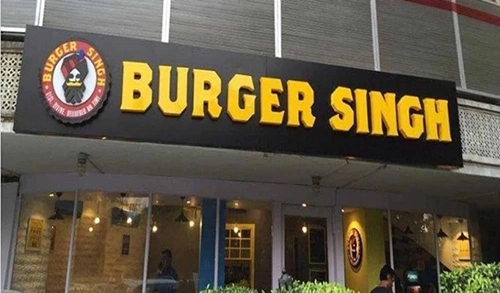India’s quick-service restaurant (QSR) industry has been booming, with homegrown brands carving a niche in a market dominated by global giants. Among these, Burger Singh has emerged as a popular brand, offering burgers infused with Indian flavors. Established in 2014, Burger Singh differentiates itself by blending international fast-food concepts with Indian spices and taste preferences, making it a favorite among Indian consumers.
For entrepreneurs looking to invest in the QSR segment, a Burger Singh franchise represents an attractive opportunity. With its affordable pricing, unique product offerings, and successful expansion across India, the brand has shown strong growth potential. This article provides a detailed overview of the Burger Singh franchise cost in India, investment breakdown, eligibility criteria, profitability prospects, and application process.
Why Invest in a Burger Singh Franchise in India?
Burger Singh offers a compelling business opportunity for several reasons:
- Homegrown Brand with Global Appeal: Burger Singh capitalizes on India’s love for spicy and flavorful food by offering Indianized burgers that stand out from competitors.
- Rapid Expansion: The brand has been expanding aggressively, with over 100 outlets across major Indian cities, including Delhi-NCR, Mumbai, and Pune.
- Affordable Investment: Compared to international QSR brands, Burger Singh offers a lower investment threshold, making it accessible to more entrepreneurs.
- Proven Business Model: The franchise model emphasizes profitability through delivery-focused outlets, reducing overhead costs.
- Growing Fast-Food Market: The Indian QSR market is expected to reach ₹82,500 crore by 2025, growing at a CAGR of 18%, offering ample opportunities for franchise growth.
Types of Burger Singh Franchise Models
Burger Singh offers different franchise models to cater to various investment capacities and business objectives:
Cloud Kitchen Franchise:
- Focuses exclusively on online deliveries without dine-in facilities.
- Requires minimal space (200-400 sq. ft.) and lower investment.
- Ideal for urban areas with high demand for food delivery services.
Food Court Outlet:
- Located in shopping malls, airports, and commercial complexes.
- Medium-sized setup (300-600 sq. ft.) focused on quick service with limited seating.
High-Street Outlet (Dine-In):
- Full-service restaurants located in high-traffic areas like high streets and commercial hubs.
- Requires larger space (600-1,000 sq. ft.) with seating arrangements for dine-in customers.
Drive-Thru Outlet:
- Located near highways and suburban areas, catering to customers seeking quick and convenient meals on the go.
- Requires significant investment but offers high revenue potential.
Burger Singh Franchise Cost in India

The cost of a Burger Singh franchise in India varies depending on the franchise model chosen. On average, the initial investment ranges from ₹16 lakh to ₹50 lakh. Here’s a detailed breakdown:
1. Cloud Kitchen Model
- Initial Investment: ₹16 lakh to ₹18 lakh
- Franchise Fee: ₹5 lakh
- Setup Costs: ₹10 lakh (kitchen equipment, interiors, and branding)
- Working Capital: ₹1 lakh
- Royalty Fee: 8% of gross sales
2. Food Court Outlet
- Initial Investment: ₹25 lakh to ₹30 lakh
- Franchise Fee: ₹7 lakh
- Setup Costs: ₹18 lakh to ₹22 lakh
- Working Capital: ₹3 lakh
- Royalty Fee: 8% of gross sales
3. High-Street Outlet (Dine-In)
- Initial Investment: ₹40 lakh to ₹45 lakh
- Franchise Fee: ₹10 lakh
- Setup Costs: ₹30 lakh to ₹35 lakh (kitchen equipment, seating, interiors)
- Working Capital: ₹5 lakh
- Royalty Fee: 8% of gross sales
4. Drive-Thru Outlet
- Initial Investment: ₹45 lakh to ₹50 lakh
- Franchise Fee: ₹12 lakh
- Setup Costs: ₹35 lakh to ₹38 lakh
- Working Capital: ₹5 lakh
- Royalty Fee: 8% of gross sales
Eligibility Criteria for Owning a Burger Singh Franchise
To maintain its brand standards and operational efficiency, Burger Singh follows a structured franchise selection process. The key eligibility criteria include:
Financial Capability:
- Applicants must demonstrate the ability to invest ₹16 lakh to ₹50 lakh, depending on the chosen franchise model.
Business Acumen:
- While prior experience in the food and beverage sector is preferred, it is not mandatory. However, strong business management skills are essential.
Operational Commitment:
- Burger Singh expects franchisees to be actively involved in daily operations, ensuring adherence to the brand’s service and quality standards.
Location Feasibility:
- The proposed location should be in high-footfall areas like malls, commercial hubs, or residential neighborhoods, with adequate space based on the franchise model.
Steps to Apply for a Burger Singh Franchise in India
Aspiring entrepreneurs can apply for a Burger Singh franchise by following these steps:
Submit an Application:
- Fill out the franchise application form available on the official Burger Singh website, providing details about financial background, preferred location, and business experience.
Screening and Interview Process:
- The Burger Singh team reviews applications and conducts interviews to evaluate the applicant’s suitability for the franchise.
Location Assessment:
- The franchisor evaluates the proposed location based on visibility, accessibility, and market demand.
Franchise Agreement:
- Once approved, the franchisee signs a comprehensive agreement detailing operational guidelines, revenue-sharing terms, and compliance requirements.
Training and Store Setup:
- Burger Singh provides extensive training covering store management, food preparation, customer service, and marketing strategies.
Store Launch:
- After successful training and setup, the store is launched with marketing and promotional support from Burger Singh.
Profitability and Return on Investment (ROI)
Burger Singh franchises offer attractive profitability prospects, especially in urban areas with high demand for fast food. Here’s an overview of potential returns:
Annual Revenue:
- A well-located Burger Singh outlet can generate ₹1 crore to ₹3 crore annually, depending on location and model.
Net Profit Margins:
- Profit margins typically range from 15% to 20%, depending on operational efficiency and market demand.
Break-even Period:
- The average break-even period is 18 to 24 months, depending on sales performance and cost management.
Challenges of Owning a Burger Singh Franchise
While owning a Burger Singh franchise is rewarding, franchisees should be aware of the following challenges:
Intense Competition:
- The Indian QSR market is highly competitive, with established players like McDonald’s, Burger King, and KFC.
Location Sensitivity:
- The success of the outlet heavily depends on its location. Poor site selection can impact sales and profitability.
Operational Challenges:
- Managing supply chains, ensuring quality control, and maintaining customer satisfaction require constant attention and expertise.
Conclusion
Investing in a Burger Singh franchise in India is an excellent opportunity for entrepreneurs seeking to enter the fast-growing QSR market. With its unique Indianized menu, affordable investment requirements, and robust operational support, Burger Singh stands out as a promising business venture.
The Burger Singh franchise cost in India ranges from ₹16 lakh to ₹50 lakh, depending on the chosen franchise model. The brand’s focus on delivery-centric outlets, coupled with a flexible franchise structure, ensures lower operational risks and attractive returns.
For aspiring entrepreneurs ready to meet the brand’s operational standards and who are committed to providing excellent customer service, owning a Burger Singh franchise could be the gateway to long-term profitability and business success in India’s thriving fast-food industry.

Shashi Kant is the Founder and Editor of BusinessScroller.com, a leading platform for business insights, finance trends, and industry analysis. With a passion for journalism and expertise in business reporting, he curates well-researched content on market strategies, startups, and corporate success stories. His vision is to provide valuable information that empowers entrepreneurs and professionals. Under his leadership, BusinessScroller.com has grown into a trusted source for in-depth articles, customer care guides, and financial expertise.



Want to franchies to hotle resturant bar Audi etc